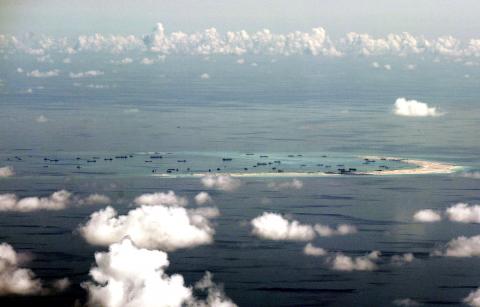China could use militarized islands in the South China Sea to stop the US from helping Taiwan in a crisis, a Washington conference was told.
The US is “quite concerned” the islands will increase China’s anti-access area-denial and general power-projection capabilities, said Bonnie Glaser, senior adviser for Asia at the Center for Strategic and International Studies (CSIS).
“This, of course, depends what equipment, what platforms China deploys,” Glaser said.

Photo: AP
Glaser said that potentially there could be surface-to-air missiles, anti-ship cruise missiles, manual and automatic aircraft and surface combatants.
She said runways would support refueling operations that would substantially extend the operational ranges of Chinese aircraft.
They could provide the capability to hold US forces at risk at a further distance than at present,” Glaser said.
A consultant for the US government on East Asia, she said US access to the region could be hindered if the US were seeking to defend Taiwan in a crisis.
“US ability to maneuver within the region would be potentially affected,” she told the fifth annual CSIS South China Sea Conference this week.
Glaser said that the most “prominent and problematic” development in the South China Sea over the past year had been China’s transformation of submerged or semi-submerged rocks and reefs into artificial islands.
She said the first Chinese objective was to assert sovereignty and administrative control.
Satellite imagery shows an “enormous amount of construction” and a good deal of it potentially for military facilities, Glaser said.
“This includes harbors, the very long runway — more than 3,000m — on Fiery Cross Reef [Yongshu Reef, 永暑礁], potentially hangers for aircraft — although I don’t think we have seen that yet — radars, other capabilities that will enable China to increase the size and the scope of its maritime presence.”
Taiwan also claims the reef.
Glaser said that China had about eight coast guard ships generally operating in the South China Sea at any given time and had limited capability to conduct intelligence, surveillance and reconnaissance.
However, “these would increase substantially with the use of these artificial islands, including electronic eavesdropping, potentially operating AWACS [Airborne early warning and control],” she added.
There is also the potential for China to establish an air defense identification zone, as it has done in the East China Sea, she said.
“It’s possible that, in order to monitor and enforce such a zone effectively, that China might really need more than one runway,” Glaser said. “Now it has one in the Paracels [Paracel Islands, Xisha Islands, 西沙群島] and will soon have one operational in the Spratlys [Spratly Islands, Nansha Islands, 南沙群島]. The satellite imagery of Subi Reef [Jhubi Reef, 渚碧礁, in the Spratlys] shows the potential for building another runway there.”
Taiwan also claims the Spratlys and Paracels.
She said that some people dismiss the military value of the artificial islands, because the islands would be vulnerable to attack in wartime.
However, “of course, in peacetime as well as in crisis, they do have potential value,” Glaser said.

NATIONAL SECURITY THREAT: An official said that Guan Guan’s comments had gone beyond the threshold of free speech, as she advocated for the destruction of the ROC China-born media influencer Guan Guan’s (關關) residency permit has been revoked for repeatedly posting pro-China content that threatens national security, the National Immigration Agency said yesterday. Guan Guan has said many controversial things in her videos posted to Douyin (抖音), including “the red flag will soon be painted all over Taiwan” and “Taiwan is an inseparable part of China,” while expressing hope for expedited “reunification.” The agency received multiple reports alleging that Guan Guan had advocated for armed reunification last year. After investigating, the agency last month issued a notice requiring her to appear and account for her actions. Guan Guan appeared as required,

Japan and the Philippines yesterday signed a defense pact that would allow the tax-free provision of ammunition, fuel, food and other necessities when their forces stage joint training to boost deterrence against China’s growing aggression in the region and to bolster their preparation for natural disasters. Japan has faced increasing political, trade and security tensions with China, which was angered by Japanese Prime Minister Sanae Takaichi’s remark that a Chinese attack on Taiwan would be a survival-threatening situation for Japan, triggering a military response. Japan and the Philippines have also had separate territorial conflicts with Beijing in the East and South China

A strong cold air mass is expected to arrive tonight, bringing a change in weather and a drop in temperature, the Central Weather Administration (CWA) said. The coldest time would be early on Thursday morning, with temperatures in some areas dipping as low as 8°C, it said. Daytime highs yesterday were 22°C to 24°C in northern and eastern Taiwan, and about 25°C to 28°C in the central and southern regions, it said. However, nighttime lows would dip to about 15°C to 16°C in central and northern Taiwan as well as the northeast, and 17°C to 19°C elsewhere, it said. Tropical Storm Nokaen, currently

PAPERS, PLEASE: The gang exploited the high value of the passports, selling them at inflated prices to Chinese buyers, who would treat them as ‘invisibility cloaks’ The Yilan District Court has handed four members of a syndicate prison terms ranging from one year and two months to two years and two months for their involvement in a scheme to purchase Taiwanese passports and resell them abroad at a massive markup. A Chinese human smuggling syndicate purchased Taiwanese passports through local criminal networks, exploiting the passports’ visa-free travel privileges to turn a profit of more than 20 times the original price, the court said. Such criminal organizations enable people to impersonate Taiwanese when entering and exiting Taiwan and other countries, undermining social order and the credibility of the nation’s